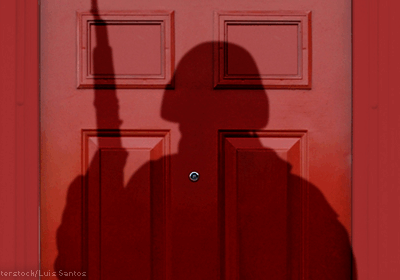News & Commentary
Get Ready to Fight for Civil Liberties in Tallahassee
The time is upon us once again. Monday, March 2 marks the start of the Florida legislature’s 2015 session and the ACLU of Florida will be at our state’s Capitol defending against bills that aim to limit your civil rights and civil liberties. We’ll also be fighting for new laws that look to expand freedoms for all Floridians. We’re excited about the work we’ll be doing and want to share just a glimpse of what’s to come.

Real People Aren’t Target Practice
The pictures of six black men stared back at me from the screen, the images of their faces shredded by bullet holes. It seemed like some kind of sick threat, but it was the work of a Florida police department.
This morning, I was greeted by the sickening news that the North Miami Beach Police Department (NMBPD) is using mug shots of black people and others for target practice. Mind you, these are not cartoons or computer-generated mug shots—these are photographs of real people, some of whom were arrested by the NMBPD itself.
By Joyce Hamilton Henry

Police Need Body Cameras – But with the Right Rules
Our country is now having a much-needed conversation about racial profiling, constitutional policing, and how to hold officers accountable for the violation of rights, all stemming from a number of recent high-profile cases where law enforcement used excessive force that resulted in the death of a suspect. These systemic problems seem overwhelming, but one concrete and important step should be implemented as soon as possible: body worn cameras for officers.

Cops as Soldiers: Could Ferguson’s Military Assault Tactics be Used Here in Florida?
The tragic shooting of Mike Brown in Ferguson, Missouri has raised many questions about how law enforcement treats the very citizens it is supposed to protect, including whether local law enforcement should be armed to the teeth with military grade equipment. Could a military response happen here in Florida? It’s impossible to know right now, and we need to change that.
In June, the ACLU released a national report on the militarization of local law enforcement, which documented the federal to local pipeline of war machines and weapons. There are several programs that enable even the smallest towns to obtain massive reserves of weapons.

Ferguson is Everytown, U.S.A.
By Nusrat Choudhury,
Staff Attorney, ACLU Racial Justice Program
This post originally appeared on ACLU National's Blog of Rights
The tragic killing of college-bound teenager Michael Brown has raised questions about the frequency with which police kill unarmed black men in America. The answer, unfortunately, is far too often.
Just three months ago, on a warm April afternoon, a white police officer shot and killed Dontre Hamilton, a 31-year-old black man, in downtown Milwaukee's Red Arrow Park. According to the Milwaukee police chief, the officer was "defending himself in a violent situation." But the eyewitness report of a Starbucks barista paints a very different picture.
According to the barista, Hamilton had been sleeping on the concrete sidewalk next to Starbucks when two police officers approached him, asked him questions, and left after determining that he was doing nothing wrong. But an hour or so later, she heard yelling. Looking out the Starbucks window, she saw a different white police officer standing up against Hamilton, "who was holding the officer's own baton in a defense posture." The officer "lunged" at Hamilton in an attempt to get the baton, but failed.
By Guest Blog- ACLU National

Internal Police Emails Show Efforts to Hide Use of Cell Phone Tracking
As we suspected, local law enforcement officials are borrowing cell phone tracking devices known as “stingrays” from the U.S. Marshals Service—and police are deliberately concealing the use of stingrays in court documents submitted to judges in criminal investigations.
The ACLU of Florida released a set of internal police emails obtained today through a public records request with the subject line “Trap and Trace Confidentiality.” The documents confirm that local police, working on state court matters, hide behind the sham cloak of the U.S. Marshals’ office to keep the information about stingray use out of court files—and beyond even a court’s custody and reach.

Federal Court in Miami Rules on One of the Major Outstanding Constitutional Privacy Questions of Our Time
By Nate Freed Wessler, Staff Attorney, ACLU Speech, Privacy & Technology ProjectIn a tremendous step forward for our right to privacy under the Fourth Amendment, the Eleventh Circuit Court of Appeals has held in United States v. Quartavious Davis that police need a warrant to obtain historical cell phone location information from a cell service provider. The ACLU filed an amicus brief in the case, along with the ACLU of Florida, Electronic Frontier Foundation, Center for Democracy & Technology, and National Association of Criminal Defense Lawyers. In April, I argued the cell phone tracking issue before a three-judge panel of the court.This ruling is the first time a federal appeals court has held that the Fourth Amendment requires a warrant when police seek cell phone location records from carriers. As the court concluded: “In short, we hold that cell site location information is within the subscriber’s reasonable expectation of privacy. The obtaining of that data without a warrant is a Fourth Amendment violation.”
By Guest Blog- ACLU National

How a Special Needs Kid Gets Handcuffed and Thrown in Jail "For Her Own Good"
By Carmel Ferrer
Like nearly half of children with autism spectrum disorder, Krystin Polk regularly attempts to wander from supervised, safe places such as her home or school.
The 13-year-old is enrolled at the Magnolia School for special education students in DeSoto County, Miss. Enrollment is contingent upon having an Individualized Educational Program (IEP), which federal law requires for all special education students.
After Krystin ran away from the school twice in one day, Magnolia staff enlisted school resource officer (SRO) Robert "Scooter" Rayborn to help locate her. Before the day was over, Krystin would be in handcuffs.
By Guest Blog

Local Police in Florida Acting Like They’re the CIA (But They’re Not)
By Nathan Freed Wessler
Staff Attorney, ACLU National Speech, Privacy & Technology Project
The City of Sunrise, Florida, tried to take a page from the CIA’s anti-transparency playbook last week when it responded to an ACLU public recordsrequest about its use of powerful cell phone location tracking gear by refusing to confirm or deny the existence of any relevant documents. And the state police are trying to get in on the act as well. We have written about the federal government’s abuse of this tactic—called a “Glomar” response—before, but local law enforcement’s adoption of the ploy reaches a new level of absurdity. In this case, the response is not only a violation of Florida law, but is also fatally undermined by records the Sunrise Police Department has already posted online.
A few weeks ago, the ACLU sent public records requests to 36 state and local Florida law enforcement agencies seeking information about their use of “cell site simulator” surveillance devices known as “Stingrays.” We were partly motivated by the discovery that the Tallahassee Police Department had argued in court to permanently seal court records discussing its Stingray use, apparently in deference to a nondisclosure agreement with the device’s manufacturer. That’s pretty offensive, but at least the new Tallahassee police chief has promised to investigate his department’s practices. The City of Sunrise’s position might be even more galling.
By Guest Blog- ACLU National

Stay Informed
Sign up to be the first to hear about how to take action.
By completing this form, I agree to receive occasional emails per the terms of the ACLU’s privacy statement.
By completing this form, I agree to receive occasional emails per the terms of the ACLU’s privacy statement.
